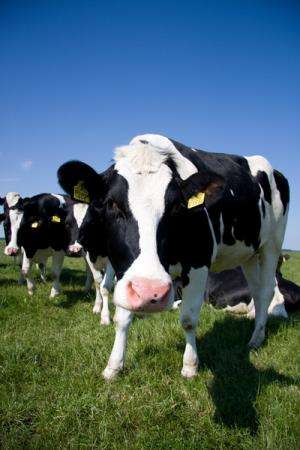Selective breeding and diet changes could produce low methane cows

The possibility of selective breeding to produce cattle that are consistently low methane emitters is being explored by an international team of scientists led by the University of Aberdeen.
The option is being investigated as part of the €7.7 million EU funded RuminOmics project which aims to increase the efficiency of the farming of ruminant animals, such as cows, while decreasing the associated environmental footprint.
Ruminants produce methane - a greenhouse gas with a global warming potential 25 times that of carbon dioxide. Methane is formed in the gut during digestion of fibrous feeds and is mainly released into the atmosphere when the cow belches.
Preliminary findings of the four-year RuminOmics project - which comprises scientists from the UK, France, Italy, Finland, Netherlands, Czech Republic and Sweden, with international advisors from Canada and Australia - add further support to the existing idea that the genetics of an animal may influence the level of methane it produces.
Professor John Wallace, who researches microbial metabolism in the gut of man and ruminants at the University of Aberdeen Rowett Institute of Nutrition and Health, is leading the study. He said: "Methane production represents a waste of feed energy, varying between two and ten percent of total energy consumed by an animal.
"Methane production is important for cattle and sheep farmers because if the amount of methane produced can be lowered then there are benefits for the environment, production, and profitability."
The RuminOmics team has been investigating methane production and feed efficiency between individual animals and the effect of different feeds. In dairy cattle they have shown that the production of methane is quite variable, particularly between individual animals. It is already known that diet can affect methane production.
Professor Wallace said: "Currently most diets which have been formulated to lower methane add cost or increase losses of other nutrients."
In one study from Sweden, increasing dietary protein concentration lowered methane per kg milk output but at the expense of increased nitrogen losses. Nitrogen is lost as ammonia in the urine which builds up in the soil and is converted to the greenhouse gas nitrous oxide.
Professor Pekka Huhtanen of the Swedish University of Agricultural Sciences, who is also part of the RuminOmics consortium, believes that researchers need to take into account both global warming and nitrogen pollution impacts when change is made to the diet of dairy cattle.
Professor Wallace added: "The RuminOmics team is finding means to identify animals which are producing less methane and are more efficient across a range of diets.
"Our work suggests there is considerable variability between individuals, with some producing more than others.
"The finding has led the team to ask whether animals which are low emitters always emit low levels under all circumstances"
The team has started to explore this and so far preliminary results, from a group of 25 dairy cattle, suggest that irrespective of what the individual animals are fed, animals which are low emitters are always low emitters, and conversely cattle which are high emitters are always high emitters.
These 25 cows are just the start of the project which will involve around 1400 animals. The results will enable the genetic influence on methane emissions to be be determined.
The RuminOmics team aim to use the data generated to develop new models and tools which will enable the livestock industry to select cattle that will have less environmental impact from methane and nitrogen emissions and improve feed efficiency.
*Examples of ruminants include cows, sheep, deer and goats. They are herbivores that characteristically have a stomach divided into four compartments and chew the cud which consists of regurgitated partially digested food.
Provided by University of Aberdeen

















